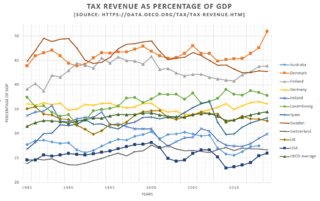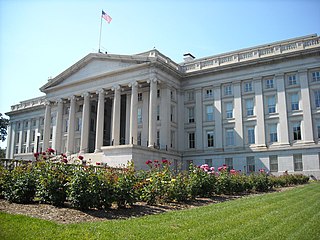History
Following the formation of a new Labour-led coalition government in the weeks after the 2017 general election, Prime Minister Jacinda Ardern announced that the incoming government would establish a Tax Working Group under its 100-day plan. [5] On 23 November, it was announced that former Finance Minister Sir Michael Cullen would be heading the Working Group. While the Tax Working Group would have a mandate over New Zealand's taxation system, it was directed to look at specific areas including the Goods and Services Tax and alleviating the housing market. While the Working Group would not have the power to change the GST rate, it would be able to advise on removing or adding GST to certain goods such as female hygiene products, fruits, vegetables, and "basic food items." [1]

The Sixth Labour Government has governed New Zealand since 26 October 2017. It is headed by Labour Party leader and Prime Minister Jacinda Ardern.

The Prime Minister of New Zealand is the head of government of New Zealand. The incumbent Prime Minister, Jacinda Ardern, leader of the New Zealand Labour Party, took office on 26 October 2017.

Jacinda Kate Laurell Ardern is a New Zealand politician serving as the 40th and current Prime Minister of New Zealand since 26 October 2017. She has also served as the Leader of the Labour Party since 1 August 2017. Ardern has been the Member of Parliament (MP) for the Mount Albert electorate since 8 March 2017; she was first elected to the House of Representatives as a list MP at the 2008 general election.
On 20 December, the New Zealand Government announced that the Tax Working Group would consist of a mixture of individuals from various backgrounds including academics, tax experts, and people with private sector, union, and Māori community experiences. In addition to its Chair Sir Michael Cullen, other Working Group members would include:

The Māori are the indigenous Polynesian people of New Zealand. Māori originated with settlers from eastern Polynesia, who arrived in New Zealand in several waves of canoe voyages some time between 1250 and 1300. Over several centuries in isolation, the Polynesian settlers developed a unique culture, with their own language, a rich mythology, and distinctive crafts and performing arts. Early Māori formed tribal groups based on eastern Polynesian social customs and organisation. Horticulture flourished using plants they introduced; later, a prominent warrior culture emerged.
- Professor Craig Elliffe, University of Auckland
- Joanne Hodge, former tax partner at Bell Gully
- Kirk Hope, Chief Executive of Business New Zealand
- Nick Malarao, senior partner at Meredith Connell
- Geof Nightingale, partner at PwC New Zealand
- Robin Oliver, former Deputy Commissioner at Inland Revenue
- Hinerangi Raumati, Chair of Parininihi ki Waitotara Inc
- Michelle Redington, Head of Group Taxation and Insurance at Air New Zealand
- Bill Rosenberg, Economist and Director of Policy at the Council of Trade Unions
- Marjan Van Den Belt, Assistant Vice Chancellor (Sustainability) at Victoria University of Wellington [2]
The Tax Working Group is due to hold its first meeting at the end of January 2018. [2]
Proposed capital gains tax
In mid-February 2019, the Tax Working Group recommended that the New Zealand Government implement a capital gains tax (CGT) and use the revenue generated to lower the personal tax rate and to target polluters. This proposed capital gains tax would cover assets such as land, shares, investment properties, business assets and intellectual property. It proposed setting a tax rate of 33% at the income-earner's top rate level. The Tax Working Group also proposed raising social welfare net benefits to allow low-incomer earners to cope with to post-tax threshold adjustments. However, other assets such as family homes, cars, boats and art would be exempt from the CGT. Tax Working Group Chairman Cullen claimed that the capital gains tax would raise NZ$8.3 billion over the next five years. [6] [7]
Finance Minister Grant Robertson and Revenue Minister Stuart Nash welcomed the Tax Working Group's recommendations. Robertson said that the Labour Party would seek to build a consensus with its coalition partners New Zealand First and the Greens. Nash also praised the Tax Working Group for identifying weaknesses in the country's taxation system and said that the report presented the government with options on tackling it. Government spokespersons also said that they would study the report and inform the public if they were introducing a capital gains tax by April 2019. [6]
Opposition Leader Simon Bridges of the National Party criticized the proposed capital gains tax as an assault on the "Kiwi way of life" and vowed to fight it every step of the way. Similarly, National's Finance Spokesperson Amy Adams claimed that the Tax Working Group was proposing a massive tax grab that would hurt the New Zealand economy and taxpayers. [8] Businesses, landlords, and farmers have objected to the proposed tax while trade unions including the New Zealand Council of Trade Unions and environmental groups have expressed support for the proposed CGT. [9] [10]
A tax is a mandatory financial charge or some other type of levy imposed upon a taxpayer by a governmental organization in order to fund various public expenditures. A failure to pay, along with evasion of or resistance to taxation, is punishable by law. Taxes consist of direct or indirect taxes and may be paid in money or as its labour equivalent.
A flat tax is a tax system with a constant marginal rate, usually applied to individual or corporate income. A true flat tax would be a proportional tax, but implementations are often progressive and sometimes regressive depending on deductions and exemptions in the tax base. There are various tax systems that are labeled "flat tax" even though they are significantly different.
An income tax is a tax imposed on individuals or entities (taxpayers) that varies with respective income or profits. Income tax generally is computed as the product of a tax rate times taxable income. Taxation rates may vary by type or characteristics of the taxpayer.
A dividend tax is the tax imposed by a tax authority on dividends received by shareholders (stockholders) of a company.
A capital gains tax (CGT) is a tax on capital gains, the profit realized on the sale of a non-inventory asset that was greater than the amount realized on the sale. The most common capital gains are realized from the sale of stocks, bonds, precious metals, and property. Not all countries implement a capital gains tax and most have different rates of taxation for individuals and corporations.
Negative gearing is a form of financial leverage whereby an investor borrows money to acquire an income-producing investment and the gross income generated by the investment is less than the cost of owning and managing the investment, including depreciation and interest charged on the loan. The investor may enter into a negatively geared investment expecting tax benefits or the capital gain on the investment, when the investment is ultimately disposed of, to exceed the accumulated losses of holding the investment. The investor would take into account the tax treatment of negative gearing, which may generate additional benefits to the investor in the form of tax benefits if the loss on a negatively geared investment is tax-deductible against the investor's other taxable income and if the capital gain on the sale is given a favourable tax treatment.

Taxation in the United Kingdom may involve payments to at least three different levels of government: central government, devolved governments and local government. Central government revenues come primarily from income tax, National Insurance contributions, value added tax, corporation tax and fuel duty. Local government revenues come primarily from grants from central government funds, business rates in England, Council Tax and increasingly from fees and charges such as those for on-street parking. In the fiscal year 2014–15, total government revenue was forecast to be £648 billion, or 37.7 per cent of GDP, with net taxes and National Insurance contributions standing at £606 billion.

The goods and services tax (GST) in Australia is a value added tax of 10% on most goods and services sales, with some exemptions and concessions. GST is levied on most transactions in the production process, but is in many cases refunded to all parties in the chain of production other than the final consumer.

Taxation in the Republic of Ireland in 2017 came from Personal Income taxes, and Consumption taxes, being VAT and Excise and Customs duties. Corporation taxes represents most of the balance, but Ireland's Corporate Tax System (CT) is a central part of Ireland's economic model. Ireland summarises its taxation policy using the OECD's Hierarchy of Taxes pyramid, which emphasises high corporate tax rates as the most harmful types of taxes where economic growth is the objective. The balance of Ireland's taxes are Property taxes and Capital taxes.
Income tax in Australia is imposed by the federal government on the taxable income of individuals and corporations. State governments have not imposed income taxes since World War II. On individuals, income tax is levied at progressive rates, and at one of two rates for corporations. The income of partnerships and trusts is not taxed directly, but is taxed on its distribution to the partners or beneficiaries. Income tax is the most important source of revenue for government within the Australian taxation system. Income tax is collected on behalf of the federal government by the Australian Taxation Office.
Capital gains tax (CGT), in the context of the Australian taxation system, is a tax applied to the capital gain made on the disposal of any asset, with a number of specific exemptions, the most significant one being the family home. Rollover provisions apply to some disposals, one of the most significant of which are transfers to beneficiaries on death, so that the CGT is not a quasi estate tax.

Taxes in New Zealand are collected at a national level by the Inland Revenue Department (IRD) on behalf of the Government of New Zealand. National taxes are levied on personal and business income, and on the supply of goods and services. There is no capital gains tax, although certain "gains" such as profits on the sale of patent rights are deemed to be income – income tax does apply to property transactions in certain circumstances, particularly speculation. There are currently no land taxes, but local property taxes (rates) are managed and collected by local authorities. Some goods and services carry a specific tax, referred to as an excise or a duty, such as alcohol excise or gaming duty. These are collected by a range of government agencies such as the New Zealand Customs Service. There is no social security (payroll) tax.

Income taxes are the most significant form of taxation in Australia, and collected by the federal government through the Australian Taxation Office. Australian GST revenue is collected by the Federal government, and then paid to the states under a distribution formula determined by the Commonwealth Grants Commission.
Goods and Services Tax in Singapore is a broad-based value added tax levied on import of goods, as well as nearly all supplies of goods and services. The only exemptions are for the sales and leases of residential properties, importation and local supply of investment precious metals and most financial services. Export of goods and international services are zero-rated.
In the United States of America, individuals and corporations pay U.S. federal income tax on the net total of all their capital gains. The tax rate depends on both the investor's tax bracket and the amount of time the investment was held. Short-term capital gains are taxed at the investor's ordinary income tax rate and are defined as investments held for a year or less before being sold. Long-term capital gains, on dispositions of assets held for more than one year, are taxed at a lower rate.
NOTE: The general information, and the tables in particular, contained in this page was taken from the South African Revenue Service (SARS) website www.sars.gov.za and/or the South African Reserve Bank Website www.resbank.co.za unless specifically noted.
Goods and Services Tax (GST) is an indirect tax imposed in India on the supply of goods and services. GST is imposed at every step in the production process, but is meant to be refunded to all parties in the various stages of production other than the final consumer.










